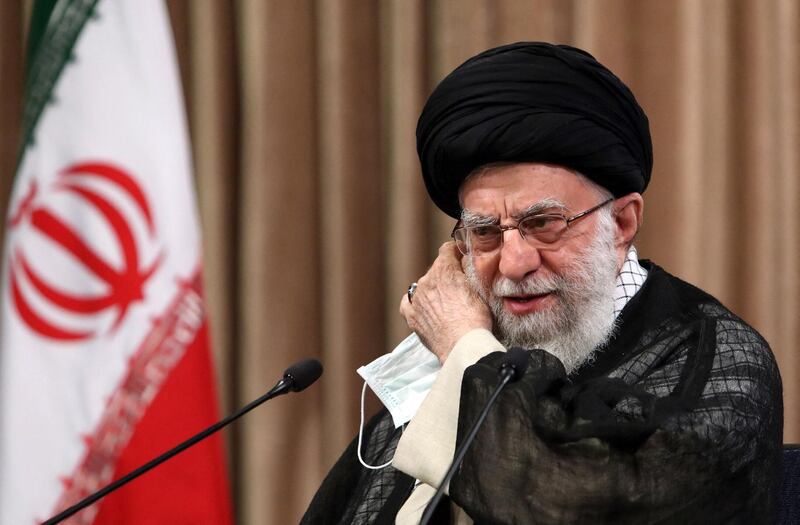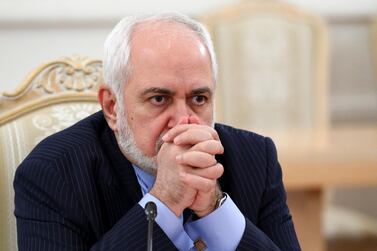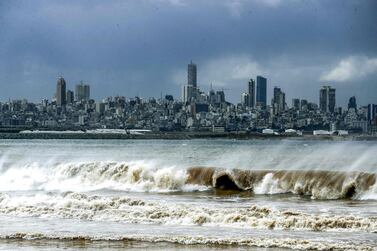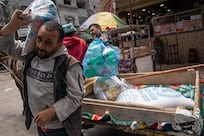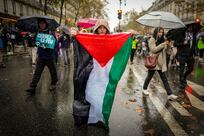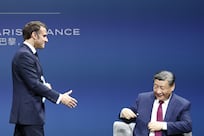When Iran’s foreign minister, Javad Zarif, was caught on tape last week criticising the Islamic Revolutionary Guard Corps’ domination of his country’s foreign policy, the implications were revealing. “In the Islamic Republic the military field rules,” Mr Zarif said, before adding, “I have sacrificed diplomacy for the military field rather than the field servicing diplomacy.”
In many regards, that told us a great deal about why Iran finds itself at a crucial moment as it tries to consolidate its power in several Arab states: Yemen, Lebanon, Syria and Iraq. In focusing entirely on maintaining tight control, regardless of the devastating repercussions of such an approach on the countries where it is present, Iran is generating growing resentment to its presence.
As the main instruments of such hegemony, the IRGC and its local proxies have brought ruin to Arab countries where they are involved. Syria has been destroyed by war, as has Yemen; Lebanon is bankrupt, while Hezbollah’s sway has discouraged Arab assistance, and pro-Tehran groups in Iraq have blocked calls for reform and the country’s normalisation with its neighbours for fear that Iran may pay a price.
But something is shifting. The end of the war in Syria has led to a push by certain Arab states to redefine their relationship with the regime of President Bashar Al Assad. For these states, the enormous cost of reconstruction, coupled with a strong Russian desire to stabilise the Syrian situation by reintegrating the country into the Arab fold, has created opportunities that make Iran uneasy.

Syria’s embrace by Arab countries, especially its return to the Arab League, may be preceded by a discussion of what each side can give the other. The Iranians understand that the first demand of Mr Al Assad will be that he take his distance from Iran. While the Syrian president will never go as far as the Arab states want, he may try to widen his margin of manoeuvre with regard to Iran.
In a few weeks, there will be a presidential election in Syria. It democratic value will be negligible, but Mr Al Assad will use the vote to reboot his rule. One ambition may well be to play Iran and Russia off against each other in order to reinforce his still-fragile authority. He has a valuable ally in the Russians, another factor that may preoccupy security-oriented officials in Tehran.
Russia clearly believes that the optimal way of calming the situation in Syria is to facilitate Arab backing for Syrian reconstruction and securing Arab endorsement of the Al Assad regime. Russian foreign minister Sergei Lavrov visited the Gulf states in March, where he discussed Syria among other things. His visit then with the Qatari and Turkish foreign ministers in Doha suggested that Russia could play a role in bridging gaps among regional countries that remain apart on Syria.
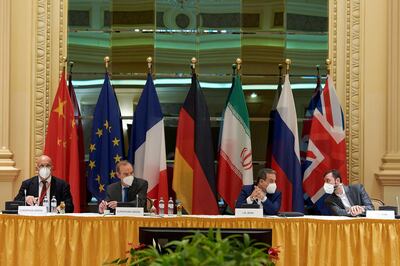
From Iran’s perspective, such dynamics are taking place in a diplomatic context in which it has a smaller presence. The Astana process, in which Iran was involved, is no longer functional. However, Tehran still retains significant levers to shape favourable outcomes. In Syria it is highly influential in key military and security institutions of the state. It also retains great power in Lebanon, where Hezbollah is the actor most likely to weather the country’s breakdown.
Yet there are also potential problems ahead. As more countries are involved in Syria’s normalisation, the wider will be Mr Al Assad’s latitude to claw back some power from the Iranians – in Syria and even Lebanon. As the Lebanese situation deteriorates, the result is likely to be greater fragmentation. This means that Hezbollah would have fewer means of controlling the situation in the country through the institutions of a now-eroding state, opening up wider spaces for others to play a role.
Syria will almost certainly interpret improved ties with the Arab states as an invitation to revive its networks and allies in Lebanon, and it may have Arab backing if the consequence is to partly reduce the extent of Hezbollah’s and Iran’s reach. With a Lebanese presidential election next year, Damascus will likely push for Mr Al Assad’s close ally Suleiman Franjieh to be elected.
In light of such developments, the nuclear deal takes on new importance for Tehran. If an agreement is reached, it would allow Iran to use the anticipated revenues to bolster its position both in Syria and Lebanon. That does not mean that Arab and Russian aims will be undermined, however, as a zero-sum situation in Syria is doubtful for the Arab states and Russia, as it is for Iran.
What is to be expected is a situation in which Iran may have to share more power in the Levant with the Arab states and Russia, as a necessary step towards Syria’s regional rehabilitation. Turkey and Israel already have a say in what happens in Syria, and how Mr Al Assad deals with both countries will affect Iran. The IRGC may believe that too many cooks would spoil its regional pot, but Iran’s tendency to destroy Arab states where it is present makes such intervention inevitable.
Michael Young is a senior editor at the Carnegie Middle East Centre in Beirut and a Lebanon columnist for The National
